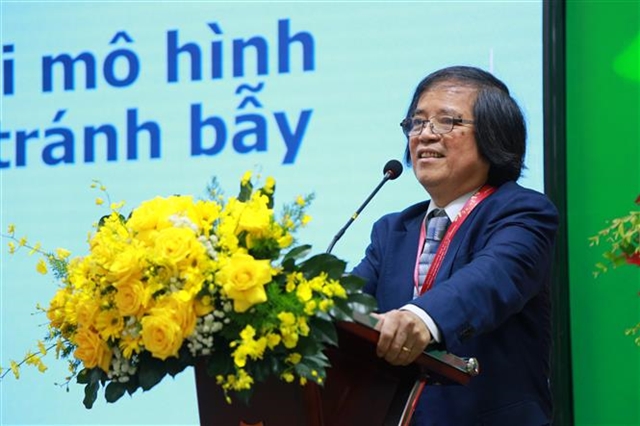.jpg) Society
Society

 |
| Trần Văn Thọ, Emeritus Professor at Waseda University of Japan. — VNA/VNS Photo |
ĐÀ NẴNG — Nearly 200 experts and scientists from universities and research institutes across Việt Nam, Japan, and other regional countries gather at an international scientific workshop that opened in the central city of Đà Nẵng on October 24 to strategise Việt Nam's ascension to a high-income status by 2045.
Co-hosted by the Economic Research Institute for ASEAN and East Asia (ERIA) and Đông Á University, the two-day event unveils key findings from the ERIA Report, a two-year research project titled "Việt Nam 2045: Issues and Challenges for Development". This comprehensive study was submitted to leaders of both Việt Nam and Japan in November 2023.
The workshop features four working sessions and a forum, bringing together 14 thematic reports offering insights into Việt Nam's economic landscape.
The opening session set the tone with discussions on balanced development models, growth model transformation, and policies to avoid the middle-income trap. Speakers delve into the new wave of digital transformation, the Fourth Industrial Revolution, the Internet of Things (IoT), and Artificial Intelligence (AI).
The subsequent sessions explore the impact of the external environment, drivers of industrial development, and emerging issues relevant to Việt Nam's development goals until 2045.
Trần Văn Thọ, Emeritus Professor at Waseda University of Japan, stressed that escaping the middle-income trap and achieving sustained growth requires Việt Nam to prioritise policies that foster industrialisation, support small- and medium-sized enterprises (SMEs), enhance manufacturing-driven markets, elevate education and training, and invest in research and development.
Prof. Yasuhiro Yamada, senior policy fellow at ERIA, underscored the necessity for Việt Nam to achieve an annual growth rate of 5.4 per cent to attain the status by the date. This goal necessitates productivity and industrial upgrades, and a shift from input-based growth to innovation-driven one, with key industries such as electronics, advanced agriculture, apparel, digital transformation sectors, automotive, health care, and energy poised to lead the charge toward a thriving circular economy.
Deputy Chairwoman of the municipal People’s Committee Nguyễn Thị Anh Thi called for ongoing reform and innovation to fuel economic growth. She highlighted the rapid advancement of the Fourth Industrial Revolution, AI, and IoT as essential components of this transformative journey. — VNS




